Good morning!
Greetings in the name of Father, Son, and Holy Spirit.
Praying for you, your family, your community, and the rest of the world. Right now, the whole world is suffering because of the Coronavirus (COVID-19). Let’s pray together to God, Our Ever-Loving Father, His mercy and protection on all, and God’s healing on those who are infected by the COVID-19. We all believe God’s grace and love rest on all who look upon Him every moment with faith in Him.
The faithful love of the LORD never ends!
His mercies never cease.
Great is his faithfulness;
his mercies begin fresh each morning.
I say to myself, “The LORD is my inheritance;
therefore, I will hope in him!” (Lamentations 3:22-24)
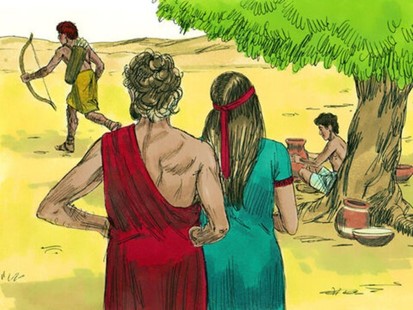
After getting married, Isaac realized that Rebekah could not have a baby. Isaac prayed to God fervently and faithfully, and he believed that God would provide a baby through Rebekah. He prayed not just days and months years, but ten’s years. Precisely speaking, he prayed 19 years, and God opened up Rebekah’s womb. Rebekah was pregnant. God answered Isaac’s persistent prayers for 19 years.
When the time came to give birth, Rebekah discovered that she did indeed have twins! The first one was very red at birth and covered with thick hair like a fur coat. So they named him Esau. Then the other twin was born with his hand grasping Esau’s heel. So they named him Jacob. Since, his birth, Jacob was always jealous of his older brother’s birthright. He always wanted to be the first, and his jealousy and dissatisfaction shaped him.
As the boys grew up, Esau became a skillful hunter. He was an outdoorsman, but Jacob had a quiet temperament, preferring to stay at home. Isaac loved Esau because he enjoyed eating the wild game Esau brought home, but Rebekah loved Jacob. They became quite different characters. However, Jacob always wanted to be the firstborn, which created tension in the family. The parents did not ease this tension between the brothers. Instead, each chose and only loved their own favorite son.
One day when Jacob was cooking some stew, Esau arrived home from the wilderness exhausted and hungry. Esau said to Jacob, “I’m starved! Give me some of that red stew!”
Jacob quickly realized that it was an excellent opportunity that Jacob could trick his brother and claim the birthright as the firstborn. Then Jacob replied, “All right, but trade me your rights as the firstborn son.”
Esau did not give any deep thought because he did not care for his birthright as the firstborn son. “Look, I’m dying of starvation!” said Esau. “What good is my birthright to me now?”
Jacob could not lose the opportunity. He had to grab the birthright of Esau when it was available. Jacob said, “First you must swear that your birthright is mine.” Again, Esau did not care for his birthright and carelessly swore an oath, thereby selling all his rights as the firstborn to his brother, Jacob.
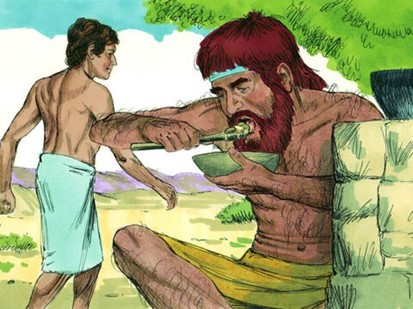
Then Jacob quickly gave Esau some bread and lentil stew. Esau gladly took them without knowing what he was doing. He sold such a precious firstborn birthright to Jacob, who tenaciously wanted to have the birthright. Esau quickly ate the bread and lentil stew. Then he got up and left as if nothing had happened. Esau showed contempt for his rights as the firstborn. Again, it was the greatest mistake that he had ever made.
For God so loved the world that he gave his one and only Son, that whoever believes in him shall not perish but have eternal life. (John 3:16)
God so loved us, and He gave his one and only Son, Jesus Christ, to make us His children by forgiving all our sins and transgressions by sacrificing His Son on the cross, which is the love of God. The blood of Jesus Christ purchases us, and we are the most precious to God’s eye. However, some of us showed contempt for the precious birthright as the children of God by treating it lightly and even selling it cheaply to the world by trading it with the pleasures of the world. Especially when we sell God’s birthright to the world, nothing happens immediately. But it goes deep in our hearts and keeps growing till fully mature. When the time comes, it takes over the entirety of ourselves by utterly destroying us. Thus, we need to watch out by being vigilant about the deceptively sneaky enticement of the world.
Isaac and Rebekah did not help ease the tension and eliminate the extreme jealousy of Jacob about his brother’s birthright as the firstborn. Instead, each loved their own favorite son.
One day when Isaac was old and turning blind, he called for Esau, his older son, and said, “My son.”
“Yes, Father?” Esau replied.
“I am an old man now,” Isaac said, “and I don’t know when I may die. Take your bow and a quiver full of arrows, and go out into the open country to hunt some wild game for me. Prepare my favorite dish, and bring it here for me to eat. Then I will pronounce the blessing that belongs to you, my firstborn son, before I die.”
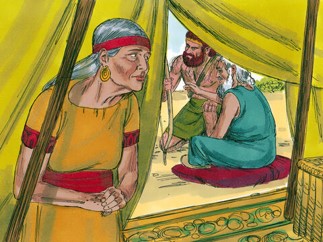
Although Isaac thought that he would die soon, Isaac lived many more years after this event. Rather it was the time that Esau’s contempt for his birthright as the firstborn became fully mature and surfaced up into the world. It also tested the favoritism prevalent in the household of Isaac and Rebekah by exposing it to their extreme partiality. It is very easy for us to be biased toward one child over the rest, but it will surely bear its fruit. When the time comes, it will bite back hard.
For God does not show favoritism. (Romans 2:11)
God has no partiality toward anyone. God loves the world, that is, everyone in this world. Thus, whoever believes in Jesus Christ as savior will receive His gift of salvation to be His eternal child regardless of whom we are.
In that way, you will be acting as true children of your Father in heaven. For he gives his sunlight to both the evil and the good, and he sends rain on the just and the unjust alike. (Matthew 5:45)
God’s love has no favoritism. God gives rain on both the just and the unjust. This is how God showed His impartiality, and so should we do. Right before Jesus spoke the above verse, Jesus looked at the people gathered around Him and said,
You have heard the law that says, ‘Love your neighbor’ and hate your enemy. But I say, love your enemies! Pray for those who persecute you! (Matthew 5:43-44)
God’s love is not just loving our neighbor and hating our enemy, but it is love for all regardless they are friendly to us or hostile to us. Indeed, is it possible to love our enemy? If so, how to love our enemy? By hugging our enemy? No, by praying for them, but not praying to God to punish our enemy for us to see justice? No. Jesus wants for us to love them deeply with our hearts truly and to give our loving prayer for them to God, which comes from both our hearts and our mouths. No favoritism means not just no harm is done, but actively love all (both our friendly neighbor and our hostile enemy) with all our heart and mind with our authentic and concrete prayer.
Can we really pray for our enemy authentically with our concrete heart before God? No. Of course, not. Nobody can pray for the enemy with all hearts and minds. Why do we classify someone as our enemy? We don’t randomly call someone our enemy. There is a reason. Our enemy is a clear threat to us, and their existence alone is dangerous to us. At any moment, we know they can come and destroy us. That’s the reason why we call “enemy.” If not, we would call them our friends with whom we love to be together and have fun fellowship together because they will surely bring joy and laughter to our lives. In other words, our enemy will never be those whom we want to be around, not like our dear friends. Then how can we love our enemy and even pray for them for God’s blessings? It is impossible with any of our humanly heart strength and effort.
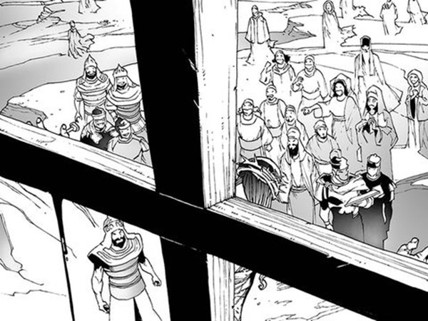
Then really seriously, how to love our enemy? First, Jesus did. He loved those who nailed Him on the cross and prayed for them God’s forgiveness by telling “They don’t know what they are doing.” Those who crucified Jesus did not know God’s love, but Jesus showed God’s love even on the cross with His dying breath.
Is there anyone who raises one’s hand while telling, “I will be like Jesus and love my enemy although my enemy gives me excruciating pain and agony till my own death?” Instead, we are easily upset on even comments with a small hint of negating or lowing us. If we hear a similar comment repetitively from the same person, then we quickly label the person as our enemy. This is our nature.
On the contrary, Jesus tells us:
I am the vine; you are the branches. Whoever abides in me and I in him, he it is that bears much fruit, for apart from me you can do nothing. (John 15:5)
Jesus is the true vine. “True” means perfect without lacking. We are branches and need the vine, not just a vine, but the true vine – Jesus Christ. When we are attached to the vine, Jesus, we are in Jesus, and Jesus is in us. As a result, the same love of Jesus on the cross is in us. Jesus bore the fruit of forgiveness for the enemy in His love, and in His love, we can do, again, not by our own willpower and strength, but by the love of Jesus acting in us. Loving our enemy is humanly impossible, but we can by the power of the love of Jesus Christ in us. Without Jesus, we are not much different from the rest, who are of the world – loving friend and hating enemy.

Isaac and Rebekah were far from the love of Jesus, which is impartial to all. They loved their own favorite son.
Rebekah quietly overheard what Isaac had said to his son Esau. So when Esau left to hunt for the wild game, she quickly came to her son, Jacob, and said, “Listen. I overheard your father say to Esau, ‘Bring me some wild game and prepare me a delicious meal. Then I will bless you in the LORD’s presence before I die.’ Now, my son, listen to me. Do exactly as I tell you. Go out to the flocks, and bring me two fine young goats. I’ll use them to prepare your father’s favorite dish. Then take the food to your father so he can eat it and bless you before he dies.”
What a sad outcome of the partiality of parents! Rebekah plotted to deceive Isaac to make his favorite son blessed! How about the other son? Should the firstborn, Esau, get what he deserved as the firstborn son from his father, Isaac? Rebekah’s opinion was different. His favorite son, Jacob, should get the blessings from Isaac, not the other son. Rebekah poured out the poison into the heart of Jacob.
“But look,” Jacob replied to Rebekah, “my brother, Esau, is a hairy man, and my skin is smooth. What if my father touches me? He’ll see that I’m trying to trick him, and then he’ll curse me instead of blessing me.”
Jacob was initially hesitant while expressing his concern, but his mother did not budge. His mother insisted by saying, “Then let the curse fall on me, my son! Just do what I tell you. Go out and get the goats for me!” What a mother who determined to take away Esau’s blessing and give it to his favorite son, Jacob.
Jacob, the mother’s boy, went out and got the young goats for his mother. Rebekah took them and prepared a delicious meal, just the way Isaac liked it. Then she took Esau’s favorite clothes, which were there in the house, and gave them to her younger son, Jacob. She also covered his arms and the smooth part of his neck with the skin of the young goats. Then she gave Jacob the delicious meal, including freshly baked bread. Everything was ready to trigger Rebekah’s plan.
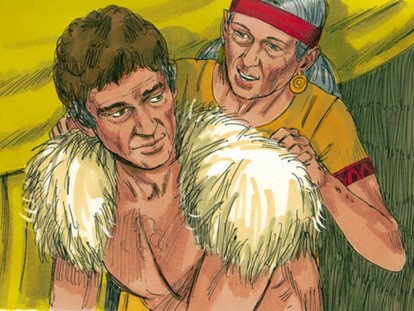
Jacob obediently heard his mother, and took the food prepared by his month to his father. What a broken family! Rebekah was against her husband, Isaac, and Jacob was against Esau. To her eyes, only Jacob was important. Everything else was nothing, and their existences were to support her and his beloved son, Jacob. Even her husband, Isaac, and her firstborn son, Esau just were there to satisfy her desire.
You want what you don’t have, so you scheme and kill to get it. You are jealous of what others have, but you can’t get it, so you fight and wage war to take it away from them. Yet you don’t have what you want because you don’t ask God for it. (James 4:2)
Rebekah used all of her worldly wisdom to get what she wanted. She used everything available to her to fulfill her worldly desire. However, the Bible says that “Yet, you don’t have what you want,” if it is of the world, not of God.
Isaac’s eyes were already dim. Isaac could not see well. He touched Jacob to verify, but Isaac touched the skin of the young goats that covered his arms and the smooth part of his neck. Thus, Isaac thought that he was touching Esau having hairy arms and neck. So Isaac ate the food prepared by Rebekah while he was thinking his favorite firstborn son prepared it. Jacob even kissed Isaac, and Isaac caught the smell of Esau’s clothes. Isaac was completely confined, and Isaac blessed Jacob instead of Esau.
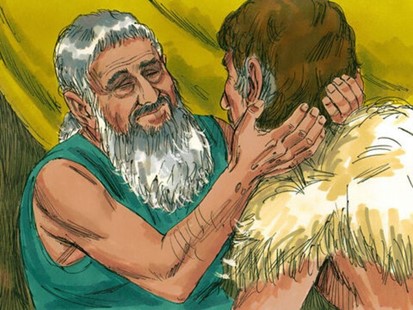
As soon as Isaac had finished blessing Jacob, and Jacob quickly got out of his father’s room. And almost before Jacob had left his father, Esau returned from his hunt. Esau prepared a delicious meal and brought it to his father. Then he said, “Sit up, my father, and eat my wild game so you can give me your blessing.”
Isaac was completely baffled, and he asked, “Who are you?”
Esau replied, “It’s your son, your firstborn son, Esau.”
Isaac began to tremble uncontrollably and said, “Then who just served me wild game? I have already eaten it, and I blessed him just before you came. And yes, that blessing must stand!”
When Esau heard his father’s words, he let out a loud and bitter cry. “Oh my father, what about me? Bless me, too!” he begged. It was too late. Esau sold his birthright of the firstborn to Jacob, and it really happened. Thus, we need to be careful about our lips, which will come true as the time comes.
But Isaac finally realized what had happened, and said, “Your brother was here, and he tricked me. He has taken away your blessing.”
From that time on, Esau hated Jacob because their father had given Jacob the blessing. And Esau began to scheme: “I will soon be mourning my father’s death. Then I will kill my brother, Jacob.” Esau determined to kill Jacob, and decided to wait till his father’s death.
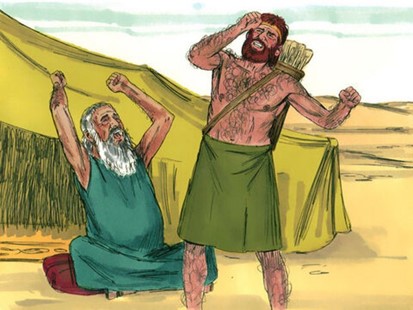
But Rebekah again overheard Esau’s plan, which was really deadly to his favorite son, Jacob. So she immediately sent for Jacob and told him, “Listen, Esau is consoling himself by plotting to kill you. So listen carefully, my son. Get ready and flee to my brother, Laban, in Haran. Stay there with him until your brother cools off. When he calms down and forgets what you have done to him, I will send for you to come back.”
Rebekah did not realize how toxic she was to all her family, including her husband, Isaac, her firstborn son, Esau, her second-born son, Jacob. She should have had confessed her sin, and asked for God’s forgiveness and guidance. Instead, she consulted with her worldly wisdom. To save Jacob’s life from Esau, Rebekah sent Jacob to his uncle, who lived in Haran. Haran was far away from where she lived. It was about 700 km, or about 440 miles away, not the distance lightly taken at that time.
Of course, Jacob knew it was not easy to travel to Haran, which had full of perils and dangers, not just the long-distance, but Jacob had no choice. Jacob clearly understood what he had done, and Esau was so mad to kill him. As a result, Rebekah sent away Jacob to save her favorite son, and Isaac was truly frustrated because Rebekah and Jacob deceived him. Their brokenness is beyond comparison.
At the end of the day, Jacob did not get what he wanted, and he had to get out of his home to run from Esau to save his life. Jacob successfully tricked his brother, Esau and his father, Isaac, with the help of his mother, Rebekah, but Jacob became empty-handed as the previous Bible verses tell, “ You want what you don’t have, so you scheme and kill to get it. You are jealous of what others have, but you can’t get it, so you fight and wage war to take it away from them. Yet you don’t have what you want because you don’t ask God for it”. (James 4:2)
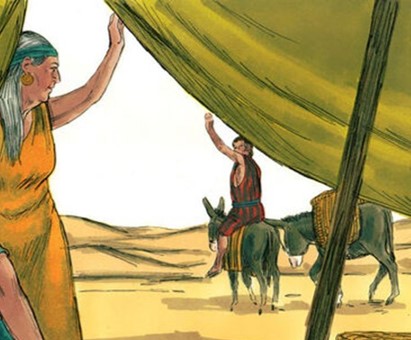
We see the result of Jacob’s over- jealousy for the birthright of the firstborn, which destroyed his entire family. Surely, it was the outcome of Jacob’s sin.
You must not covet your neighbor’s house. You must not covet your neighbor’s wife, male or female servant, ox or donkey, or anything else that belongs to your neighbor.” (Exodus 20:17)
The above is the tenth commandment of God, which God gave directly to Moses. Why did God give this particular 10th commandment?
What was the consequence of the younger son, Jacob’s coveting heart? It destroyed his entire family, and he did not get what he wanted. It was not all. Jacob ended up running for his own life, and in front of him, there was the dangerous journey of 700 km to Haran. He had to travel alone and lonely. Jacob thought he would get everything as Jacob stole the blessings from Isaac, which Isaac intended for Esau, but Jacob had nothing but the harshness of his life that he had to confront alone and lonely.
Did the story really end as we see now without our merciful and loving God? No. it was not the end of the story. God was in the mist of the tragic event as unfolding by the worldly deception of Jacob and Rebekah, plotting against Isaac and Esau. And the plot succeeded. However, God did not let all things go as planned. God had just initiated His holy and perfect plan by intervening. Jacob’s running for his life was just the beginning of God’s intervention. God lovingly intervened Jacob and the rest of the family because He loved each of them unconditionally.
God’s love is truly unfathomable. God chose Abraham and Isaac, not because they were perfect before God, but God loved them. Then God never changed His love toward Abraham and Isaac no matter how Abraham and Isaac behaved before God. Instead, God was always faithful to them.
Abraham and Isaac hit the bottom of their faith while lying about his wife to protect his own life, but God was there. They struggled in faith because of their barren wives, but God was there. As they struggled, God kept encouraging them by loving them unconditionally. Abraham spent 25 years and Isaac 20 years before getting own son and twins. 25 years and 20 years are really long time for any person to hold tight in faith. If God were not there, Abraham and Isaac would have lost their fight in faith when their doubts truly mounted. Then, we would not have had either Abraham and Isaac because both would have had perished in their doubts in faith. Only was God who made them keep going in faith.

God, unfathomably faithful to Abraham and Isaac, was equally faithful to Jacob, but Jacob did not know this truth. Jacob could not fully appreciate it until he went through all his life stages with God. Jacob truly experienced God. This is how God transformed Jacob, and us, who are His people. It is also true that we can become God’s masterpiece like Abraham and Isaac, not by just watching or knowing how others walk with God, but by experiencing God in our lives. Jacob was on the run, but God was with Jacob. God’s merciful hand was with Jacob by holding him tightly. Indeed, God did not release Jacob till Jacob became truly mature by being transformed into the person whom God truly desired. Jacob’s Godly transformation was sometimes painfully difficult. God exposed many shameful traits of Jacob’s inner being to himself and those around Jacob, which inflicted wounds in Jacob and those around him. Learning God and His love is sometimes quite painful, but leads to His righteousness.
No discipline seems pleasant at the time, but painful. Later on, however, it produces a harvest of righteousness and peace for those who have been trained by it. (Hebrews 12:11)
Next week, we will see how God led Jacob through the paths of righteousness, which were not full of worldly good things but all spectrum of life events, ups and downs, pains and joys, and sorrows and laughter. Each step by step, God used each opportunity, whether worldly or Godly, to build up Jacob as the one whom God truly desired. Even so, Jacob took many detours, but God was with Jacob. God did not let Jacob alone. God was always, yes always, with Jacob no matter how Jacob walked with God because God dearly loved Jacob as His beloved son.
What can we say about us today? We should go back to God regardless of where we are in our lives. Some of us have gone astray. Some are getting weary as walking through a long detour for a long time. Some are living painfully and feeling miserable. Some feel the sky is falling, and the world sucks them into a dark bottomless hole. Even so, God is with us. Yes, we should not forget the truth that God is with us. God, who is full of mercy and love, is right next to us by holding us tightly with His most graceful and powerful hand. God truly loves us as He loved Abraham, Isaac, and Jacob. God will be with us no matter what happens in our lives, and He will keep waking with us till God’s victory magnifies in us. This is our hope and faith in Him. Praise God! He is worthy of our highest praise.

“Who is a God like You, pardoning iniquity and passing over the transgression of the remnant of His heritage? He does not retain His anger forever, because He delights in mercy. He will again have compassion on us, and will subdue our iniquities. You will cast all our sins into the depths of the sea. (Micah 7:18-19)
